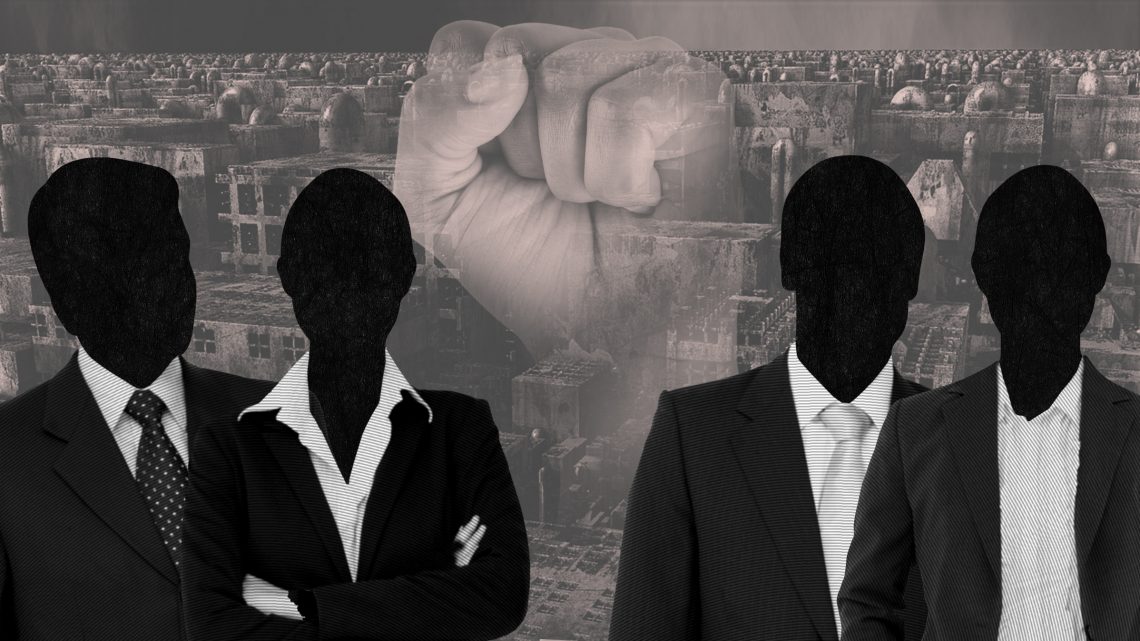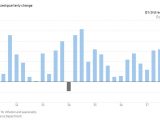
A Future Without Unions Is a Terrifying Dystopia
June 28, 2018It's mid-afternoon in late June two decades from now, and the weather in New York City is gross: hot, humid, slimy. You're trying to find your way to a job interview when you pass a child yanking on her father's arm, confused by a throng of people marching in a circle in front of them. They seem angry—there's a lot of yelling and chanting and jockeying going on—but the most confusing part, at least to the toddler's eye, is a giant inflatable rat.
"Dad, what's that?"
You know what it is, of course. Maybe your mother was a labor organizer way back when. Maybe your cousin helped unionize an online postcard startup that went bankrupt before any employees could see the benefits of a contract. But the child's father, perhaps 35 years old and gainfully employed at an Amazon subsidiary, doesn't know or doesn't care. He shrugs and pulls the kid down a side street to avoid the hubbub.
Many Americans today would recognize what was going on back there as a picket line. Labor unions and impassioned workers interested in forming them—or winning concessions from management without an official union—have picketed workplaces across the United States for well over a century. Along the way, as documented in countless films, books, songs, classic Simpsons episodes, and even memes, they won incredible victories: the 40-hour workweek, healthcare benefits, an end to child labor, and much more. Union density—the percentage of American workers who belong to one—peaked at over a third of the total labor force in the mid-1950s, thanks in part to a sort of pact between business and organized labor after World War II. Unions were institutions stitched into the fabric of mainstream America just like churches or Rotary clubs.
About seven decades later, unions are in decline and workers are in as much trouble as they have been since the 1920s. Inequality is out of control, right-wing populism is on the rise, and, thanks to a bombshell Supreme Court ruling Wednesday, organized labor is about to shrink. Union members and advocates hope the latest frontal assault from the right could help rally its membership to put up a renewed fight, but that fight is going to be a brutal one.
Despite the downward trend, the worst-case scenario is rarely contemplated: What would happen if unions actually disappeared entirely? It might seem like a crazy proposition, since polling data shows young people are high on organized labor. On the other hand, breaking unions is pretty clearly an end desired by the right-wing billionaires dictating who gets to serve as judges in the courts and hold elected office.
Obviously, if unions were erased from America, the income of unionized workers would fall. But according to research from left-leaning think tank Economic Policy Institute (EPI), declines in unionization are linked to a drop in the pay of nonunion workers, too. And the implications of organized labor's total collapse go way beyond paychecks. Without unions, racism and tribalism might get worse, cities could look physically different, rent would likely be even harder to keep up with, and weekends might become a thing of the past.
More than anything else, what emerged from conversations with economists, labor experts, sociologists and futurists is that a society without unions would look a lot like the increasingly gilded-age reality we live in now—just worse. And it's not nearly as implausible as you might think.
"We don't have to sort of wonder and fictionalize it," Celine McNicholas, director of labor law and policy at EPI, told me. "History gives us an indication—before we had meaningful labor representation and unions—of what our economy looked like."
LESS MONEY AND MORE DANGER
McNicholas was referring to the era before the 1935 National Labor Relations Act (NLRA), which enshrined collective bargaining in American law at the height of the Great Depression. The preceding era was not a pleasant one. Strikes were brutally and bloody put down by private security forces contracted by nervous—or just plain vindictive—bosses. Labor actions could resemble actual combat, like West Virginia's "Mine Wars." Workers were literally locked inside factories, sometimes resulting in their deaths. And pay was often so low as to make them wonder how they might endure next day, much less the next week or year.
"Paychecks would very much continue to erode because labor standards would be under attack," Jared Bernstein, a former economic advisor to Vice President Joe Biden now at the Center on Budget and Policy Priorities, a left-leaning think tank, told me.
There's a potential 2038 where you might find yourself trying to cope with postmodern versions of those same pre-NLRA forces. Maybe your gig at on online retailer's "fulfillment center" that paid you five dollars an hour would require dealing with 80-plus degree temperatures in a windowless warehouse with no one around in the event a machine impaled a worker against a wall. Why would the bosses bother with basic safety protections if the Occupational Safety and Health Administration (OSHA) had been trimmed down to a shadow of its former self by a corporate-dominated Congress?
To wit: Unions don't just negotiate pay-rates or basic benefits like healthcare for workers. They also hold bosses accountable for shady shit going on at the workplace. "Unions are a political force, particularly public-sector unions, which is exactly why the right has been tilted against them for so long," Bernstein explained.
Right-wing interest groups like ALEC and Republican politicians like Wisconsin Governor Scott Walker have long framed their dismantling of collective bargaining as a matter of fairness or budget issues. Why should union workers have it better than everyone else, especially if—as in the case of public-sector workers—their generous contracts come at the expense of taxpayers? But these seemingly practical concerns mask a deeper agenda: transferring wealth from workers to their bosses and the investor class. Unions effectively siphon money from management and government and give it to workers; if you could keep more of the money produced by your business—or the government you consider an extension of it—wouldn't you? It's no surprise that the relentlessly pro-business Republican Party has been on an anti-union crusade for decades. And if unions did not exist—and labor protections were further weakened as a result—the slope could get slippery, fast.
RACISM AND TRIBALISM WOULD BE ON THE RISE
Unions' dissipation wouldn't just affect the lot of people at the workplace or their economic life—it might change the face of American culture. Among other things, experts said, it could unleash even more ethnic tension and foment the kind of nativism preyed on by demagogues like Donald Trump. Suffice it to say it's probably not a coincidence that the reemergence of straight-up white nationalism in mainstream American politics came after decades of union decline.
"The solidarities that feel real to people tend to be tribal," said Todd Gitlin, a social-movement historian at Columbia University. "There's a lot of evidence that unions are the best anti-racist institutions we have." One study by historian Timothy Minchin found that membership in the AFL-CIO* made white voters who might otherwise have been reluctant to embrace the first black major-party presidential nominee more willing to give the new guy a shot.
By their very nature unions bring people together to talk about their shared problems. Workers of the future may be in dire need of that—remote work is on the rise, and a lot of app-enabled occupations are solo endeavors where you're basically taking orders from your phone. In the post-union future, there's no reason for you and your fellow "independent contractors" to actually gather in the same physical—or even online—space to chat. In fact, your boss won't allow that kind of scheming. Without your workplace exposing you to people from diverse backgrounds, your knowledge of other ethnic, gender, and cultural identities will largely be confined to what you see when streaming internet content from one of the two providers that will enjoy a joint monopoly over such services.
"The retreat into more tribal identities fills the gap when you have no set of durable organizations to bridge those divides," explained Washington University in St. Louis sociologist Jake Rosenfeld. Specifically, white men have sometimes been brought into the fold of modern social tolerance in part by affiliations with labor. "Even today, with unions at their weakest state, unions are the only organization that brings that otherwise very conservative on all dimensions part of the body politic"—white men—"in a more progressive direction, and tempers those other passions."
Of course, it hasn't always been true that pro-union elements were forces for social tolerance. The William Jennings Bryan-led populist revolts of the 1890s and early 1900s often leaned in to white supremacy. But in the last century, as the progressive era gave way to the Civil Rights movement, unions have often been a partner in fighting for people of color, women, the LGBTQ community, and other groups seeking equal protection under the law. An end to unions means those voices will be more difficult to hear.
DAILY MISERY WITH NO WEEKEND IN SIGHT
Of course, a union-less future might not exactly be devoid of workers' groups vaguely devoted to something resembling solidarity. But such organizations might be like the weak Independent Drivers Guild that formed in 2016 to represent Uber workers in New York. That group gave drivers a voice on issues at their workplace, helping them advocate for minimum-pay rules and even win changes to tipping policies, but denied them the power to collectively bargain contracts with Uber. That means it can't secure full-time employee status for its members, much less demand better, more structural pay or health or other benefits. And it should be noted it only seemed to come into existence at all because an actual union—the International Association of Machinists and Aerospace Workers—helped organize for it.
The total elimination of organized labor might seem like a fantasy, but everyone from union skeptics to pro–labor movement historians suspect the way workers band together, if they do at all, is due for a change soon.
"Our disrupted society is going to need some different way of having workers, somehow, respond," Joel Kotkin, a presidential fellow in Urban Futures at Chapman University in Orange, California, told me. Kotkin actually believes workers currently do better in low-union-density environments like right-to-work Texas where housing is cheaper on average than union bastions like Washington State and New York. But even as he cheered the idea of public-sector unions' power being reined in, he painted a dark picture of an America where gig workers who lack unions essentially rely on the goodwill of rich people who want to keep things calm.
"If you look at the long-term vision of the oligarchs, it's really a society where very few people make money," he told me. "Everyone else is propped up to live a decent—they don't live in hovels, but they never accumulate anything, and they become essentially serfs, which is where we're headed."
Whether you like or hate unions—or have mixed feelings about them, as Kotkin does—it seems perhaps most clear their continued demise or outright vanishment would not only affect inequality but what every American's daily life looks like. In a not-implausible 2038, you and your partner might struggle to pay the $4,000 rent on your halfway-decent one-bedroom apartment in a large city. Unions and their allies in the Democratic Party and broader progressive movement have tended to be at the forefront of forcing the business community to include affordable housing in their latest massive projects. If the rent is too damn high now, it'll get higher still once that movement is kneecapped. And if your pay is minuscule and you have no one fighting to guarantee you halfway plausible living expenses, things could get ugly.
"If I didn't have a union job, I would not be able to pay my rent," said Rosy Clark, a 30-year-old DSA member living in Brooklyn whose public-sector teachers' union will be affected by the recent Supreme Court decision. "I would have to live differently. I would have to live with more people. I would have to live further away from where I work. And I would have to have a less comfortable living situation by leaps and bounds."
Unions have been instrumental in securing things we now take for granted like a 40-hour work week. Without them, businesses might try to roll back even basic benefits, especially for lower-paid workers. In a union-less future, Clark suggested, you might not even have a weekend.
POLITICS WOULD GET UGLIER AND EVEN MORE TILTED TOWARD THE RICH
If the study earlier this year that found a 3.5 percent decline in Democratic presidential vote-share in "right-to-work" (or anti-union) locales was on point, it's fair to assume the drop-off would even bigger were unions to fold entirely. If unions weren't around to provide tens of millions of dollars and tens of thousands of foot soldiers every election day, progressive candidates would face an even heavier climb, especially outside big cities. The Democratic Party would suddenly be struggling in ways it's hard to imagine today.
"The party would not collapse because its base of support is much broader than only organized labor—the coalition includes civil rights groups, feminist organizations, immigrant right groups, suburban educated voters and more," Julian E. Zelizer, a professor of history and public affairs at Princeton, told me in an email. "That said, it would be devastating since—even in 2018—organized labor still is one of the few sources of mass mobilization that exists for the party."
Thanks to the collapse of the labor movement in recent decades, we're already getting a sense of what this looks like in states and localities nationwide.
"For many American workers, unions are kind of a foreign concept," Neil Gross, a sociologist at Colby College who has written about the intersection between the decline of unions and the rise of Trump, told me. "It's hard for them sometimes to grasp what it is they do and why they should have to be a part of it."
If you wanted to run for office 20 years from now as a progressive in an America without unions, doing so would be an even heavier lift unless you were able to fund your own campaign. The study that showed how the collapse of union protections could erode Democrats' political power also found that as a consequence of states passing anti-union laws, fewer working-class people sought—and won—positions of power.
The complete disappearance of unions is not an absurd hypothetical—this is a near-term possibility that is effectively already the case in some southern states that have always done everything they can to crush labor.
"For a lot of people in a lot of places, we already live in a union-less society," Peter Frase, an editor at Jacobin magazine and author of Four Futures: Life After Capitalism, told me.
Frase cautioned, like Gross and some other experts and activists, against assuming workers wouldn't find new ways to organize even in union-hostile states. More than one pointed to the teachers' strikes in Oklahoma and West Virginia and hotel workers in Nevada as examples of how people can build solidarity even when the law is stacked against them.
On the other hand, people are increasingly working independently or in jobs that don't build solidarity through physical proximity, as factory gigs once did. That would make building some kind of new model from scratch increasingly difficult. And if cities that currently have unions helping advocate for affordable housing were to suddenly be free to let the forces of capital develop as they see fit, places like Seattle and San Francisco might be even more unlivable, further complicating the project of gathering like-minded liberals in one place to force change.
Kotkin, for his part, anticipated an "increasingly feudalistic society" where the Mark Zuckerbergs of the world might believe, say, that "everybody should get a rent subsidy so they can live in a little one-bedroom apartment." On the path we're on, he suggested, tech gurus will essentially be left to set social policy on their own. Who knows, sometimes that might work out to their benefit if the guru in question wanted to help them.
"But they'll never own anything and they'll never have their own company," he told me. "They'll just be serfs to the lord."
*AFL-CIO is the umbrella union that includes VICE writers and editors.
Sign up for our newsletter to get the best of VICE delivered to your inbox daily.
Follow Matt Taylor on Twitter.


